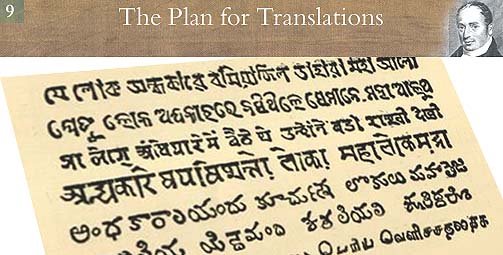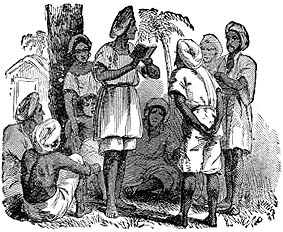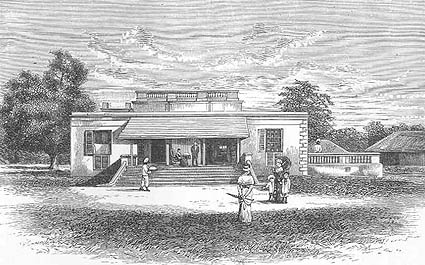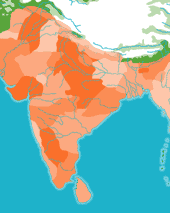

Matthew iv 16 'The people which sat in darkness saw great light' in Bengali,
Oriya, Hindi, Sanscrit, Telugu, Kurnata and Tamil. Courtesy 'The Centre for the Study of the Life and Work of William Carey D.D., 1761 - 1834.'In the course of 2 years, Mr. and Mrs. Marshman had made the boarding school so profitable that it contributed £1,000 a year to Mission funds, yet they took no more than £34 a year for their own expenses. Mr. and Mrs. Ward received only £20 a year from the Printing Office for their expenses. Mr. Carey, although on a salary of £600 a year from Fort William College, took £40 a year for himself and his family - plus £20 a year to enable him to appear at the College, and at Government House, in what they termed 'decent apparel'.
Mr. Brown, the Senior Chaplain of the Presidency, called on Carey at his rooms at Fort William College with the suggestion that a Dissenting Chapel should be set up in Calcutta for the poorer European Christians. Carey replied that his brethren had long wished to establish a place of worship for those who felt uncomfortable in the patrician congregations of the Mission Church (1) and the Presidency Church, but were apprehensive of giving umbrage to the Government. Mr. Buchanan likewise supported the establishment of a Dissenting Chapel and they assured him that they would use every effort to prevent opposition in Government. On 23rd January, 1803, the missionaries hired a room in Calcutta and held the first service in English, but with scarcely any attendance. They then hired another room at more reasonable terms where they continued to preach until the Bow Bazaar Chapel was opened in 1809.
At the start of 1803 the first Brahmin was baptised; an amiable and intelligent youth called Krishna-Prisad. He came from Debhata where Ward had distributed tracts the previous year. It was one of these that brought him to Serampore. Carey and the brethren were prepared to make no compromise on the issue of cast, and on the baptism of the first Brahmin they fixed the rule that cast would play no part in their congregation.
The day after, the missionaries were agreeably surprised by the arrival in Calcutta of Mr. Chamberlain, a new missionary sent out by the Society from England. Ward went down to the vessel to welcome his new colleague, and they went to Carey's lodgings. Ward writes 'We have no longer any dread of Calcutta.' Chamberlain reported to the police and he was allowed to leave to join the Mission at Serampore without any obstruction.
The Deva Nagree alphabet, with its 700 characters, set in type for the first time. (2) Soon after the establishment of the Printing Office, Punchanon, who had been instructed in the art of punch cutting by Sir Charles Wilkins, came to the missionaries in search of employment. Carey was considering a Sanskrit grammar which was to need Nagree type, and Punchanon was immediately engaged for the work. The complexity of the alphabet required 700 separate punches. By the beginning of 1803 they were completed. To speed up progress, an assistant was hired called Monohor, an expert and elegant workman, who was employed by the Serampore Press for the next 40 years. He later created beautiful founts in Bengali, Nagree, Persian, Arabic and other characters.
All the copies of the Bengali New Testament had been distributed and a new edition was called for. The original translation was made at Mudnabatty and was more a literal translation of the English than idiomatic Bengali. Carey was now at Fort William College in the presence of some 50 of the leading Indian scholars of the day and became aware of the failings in his original translation. He sat with Mritunjoy, the most eminent Sanskrit and Bengali scholar, for 2 or 3 hours every day. Improvements were made to the translation and all the missionaries took part in checking the proof sheets.
On 16th March, 1803, Ward writes:
'During the last year our family has enjoyed good health; we have been preserved very healthful and happy. I have no interruption of my health hitherto, nor my wife... ...I never was more full of business. I am always in the office from morning till night, with the exception of dinner and bathing hours. I hope the work of God is on the increase amongst us; we have baptized three this year, and I suppose William Carey will be baptized this month. We have received brother and sister Chamberlain by way of America, yet still we seem as busy as ever... ...If I preach half an hour here in a tolerably quiet way, I almost lose my voice. I can talk in a plain way in Bengalee, but very confined, what is preaching without figures, illustrations, and a liberty to enlarge and press home truth? Yet I do rejoice in my destination; I know not any place on earth, where I might be more useful, if I had the piety of a Pearce.'
On 4th May, 1803, Krishna-Prisad, the Brahmin convert and the daughter of Krishna-Pal, the first convert, were married. The wedding took place under a tree in front of Krishna's house. Mats, chairs and a small table were placed in the open air for the towns people to witness the event. The service was taken by Carey and the missionaries went to the wedding supper in Krishna's house. The first time they had eaten in the house of a native Christian convert. The dishes were prepared in the native style and served up according to Eastern custom. 'This' writes Ward 'was a glorious triumph over caste. A brahmin married to a soodra, and in a Christian form.'
A week after the marriage, Ward writes 'A horrible day, - the Churak Poojah, and three women burnt with their husbands, on one pile, near our house.'
In a letter to Stennett of May, 1803, Ward writes:
'I suppose you hear all the news about Serampore, as soon as it arrives. My journal contains all the particulars that come into my recollection. After this I know not what to write. Things lose their surprising quality as soon as they are seen, and hence many things, which would no doubt be pleasing to friends in England, are not thought to be worth detailing. Except heat and cold, riches and poverty, I suppose the world is much the same every where. Here are no chimnies, no hedges, no flag-pavements; rain only at particular seasons; no instances of men being frozen to death; no snow; hail is not uncommon, and ice may be made.
My wife joins in Christian love to you. Little John Fountain talks Bengalee pretty readily; he is very much like his father. Kitty Grant is like her father, and Samuel Brunsdon like his. Oh! that instead of fathers, the children might be a seed to serve him. William Carey has been baptized; he and Felix will, I hope be blessings to the Mission. Lately we have had to baptize almost every month; people from a distance, on hearing news of Christ's death, have come, been instructed, and baptized. We have now members of our church in several parts of the country. It is true, they are like sheep without a shepherd; but their simple conversions do not seem to be without fruit, and we can neither detain all the baptized at Serampore, nor constantly preside over them at their houses. Happy is it for them, that they are under the care of the Shepherd and Bishop of souls.
I am full of business, what with printing, and other things; God however, is exceedingly kind to me; yea, more than I can ask or think. I dare not ask for uninterrupted health, and yet he has given it me; I have not even tasted affliction. My wife has enjoyed an almost equal measure of health.'
On 20th June he writes 'I think my spirits are on the whole more regular than they were at Hull. I begin to have a little more pleasure in talking Bengalee, though I often wish I could tell all my heart to these people. Oh! it is a hard thing to be in labour for souls, and to be unable to speak to them.
You cannot think, how hard it is to make up a letter from this country. I think the great deficiency of Bengal, when compared with England, is its want of sweet meadows and singing birds which you have. I cannot take a walk like that to Cottingham, &c. The heat does not go off till evening, and we have no grass fields; every cow is tied in a lane or in the corn fields; no animal ranges at large; and a few hot days burn up all the herbage, which the three months of rain produce. We have a pleasant walk by the side of the river, and another in our garden, and we have fine pieces of water to bathe in, in the heat of the day.
Since I wrote the above, I have had a slight fever, but I am now well again. My wife also was poorly at the same time; but she has been graciously restored. I am full of business; we have many things in hand to print. The workmen here are not like Europeans; they want a deal of superintending; and after all, the pressmen never work things clean; so that I have not that pleasure in printing, which I might have had if I could have printed elegantly. Yet this is the great thing; we are printing the Word of Jehovah, that Word which is not to return void, but is to answer the purpose for which it is sent, that is, to be the power of God to salvation to those who believe, and the sanctifying Word to all Christ's true disciples. We shall soon begin a second edition of the New Testament, the translation of which will, I am persuaded, be better understood than the last.
Upon the whole, every thing is better than I could have expected in embracing missionary life, and we have now had as much success as I expected to see in my life, or even more - millions choose a wooden god before the ever-living Jehovah: sin and a blind go suit their depraved tastes best. Oh! my brother, you know not half, or a hundredth part of the mercy God has bestowed upon you in the circumstances of your birth, &c. nor will you ever know, unless you become a missionary, and come and live here; then you will bless God, indeed, for your Christian education, for your Bible, for the christian sabbath, for the everlasting Gospel.'

A Native Indian Preacher. Courtesy 'The Centre for the Study of the Life and Work of William Carey D.D., 1761 - 1834.'
While these events were fresh in his memory Ward writes to Dr. Ryland in England:
'Be assured that whatever Europeans may say about the impossibility of converting the Hindoos, there wants nothing more, as it respects human means, but a few men of gifts and of real powerful godliness. Hindoos and Mohammedans will as surely fall under the doctrine of the Cross as Greenlanders and Hottentots. The reason why this work has never been done yet is, because the means have never been suited to the end. It will be vain to expect that the Gospel will ever spread widely in this country, till God so blesses the means that native men shall be raised up, who will carry the despised doctrine, brought into the country by the Mlechas, into the very teeth of the brahmins, and prove from the Scriptures that this is indeed the Christ that should come into the world. We hope we see the dawn of this. I have constantly made it a point of recommending the making of native preachers as soon as possible; and I hope we may soon see two or three, who are at least more able and eloquent than some good men who are employed in England.'
It was the plan of the missionaries henceforward to concentrate their efforts on native Christian itinerants, who retained the simplicity of their own way of life, had ready access to the minds and hearts of their countrymen and preached in their own mother tongue. Unfortunately European missionary societies were to concentrate on sending out their own fellow countrymen for decades to come.
Mr. Brown, the Senior Calcutta Chaplain, purchased a house with extensive grounds, called 'Aldeen' at Serampore in April 1803, He was to reside there until his death in 1812. Brown was a man of cultivated mind and took a genuine interest in the Serampore missionaries, despite writing that Carey 'dips his brahmins in the river not far from my house.' He developed a particular friendship with Joshua Marshman, who would generally spend 2 evenings a week at his house.

The First Mission House in North India, Dinagepore. Courtesy 'The Centre for the Study of the Life and Work of William Carey D.D., 1761 - 1834.'
William Ward's strength had been impaired by his unremitting labours and he was advised to take a trip on the river. He resolved to visit Mr. Fernandez at Dinagepore. On his previous visit in 1799 he had travelled under a Danish passport, but this time, under Lord Wellesley's administration, it was unnecessary. He applied for a British passport and was granted one without hesitation. He preached and distributed tracts and spent many happy days with Mr. Fernanandez and his native itinerants, and visited Mudnabatty. 'Mr Carey's house is fast going to decay, and the walls are chalked with the odious figures of Hindoo gods.' he writes. He returned to Serampore on the 16th December, 1803.
In January 1804. Mr. Fernanadez was ordained by Carey as a minister, and he returned to Dinagepore where he continued to labour until his death in 1833, without any support from Mission funds, but he was always a liberal contributor. Soon after, 2 of the most zealous converts, Krishna-Pal and Petumber, were set apart for the ministry with the laying on of hands.
'Now' observes Ward 'we may reckon on two heathens being ministers of the Gospel.'

The languages of India. Based on a map in the 1926 edition of 'William Carey' by S. Pearce Carey. Courtesy Hodder and Stoughton. Click on the image to see the languages.
At the commencement of the year the 3 missionaries laid before the Society the plan to translate the Bible into the languages of India. They stated that there were at least 7 languages spoken in India, Bengali, Hindi, Oriya, Mahratti, Telugu, Kurnata and Tamil (the linguistics of the country were not perfectly known at the time).
Carey's connection with Fort William College put them in a position to obtain assistance from learned men from all these parts of the country; they had a large printing establishment; an efficient letter foundry capable of expansion; and they had the means for distributing the Bibles. They had started a translation in Hindi, an Oriya pundit had been engaged, and work was proceeding on translation in that language. Carey was in the process of creating a Mahratti grammar at the College. So far they had proceeded with the plan at their own expense but needed funding of £1,000 from England to continue.
A joint letter was received by Andrew Fuller, and at his insistence, a resolution was passed by the Committee on 23rd May, 1804, stating 'If our brethren should be able fully or in part to execute the plan which they have conceived of translating the Scriptures into the Eastern languages we will most cordially co-operate with them, and we are persuaded that the Christian public will not suffer the work to stop for want of pecuniary support.'
At the close of the year 1804, the first Sanskrit work ever printed, the 'Hetopudes', was published by the Serampore Press.
(1) To see an engraving of the Mission Church in Calcutta, click on the link.
(2) Deva Nagree. This would be spelt Devanagri today.